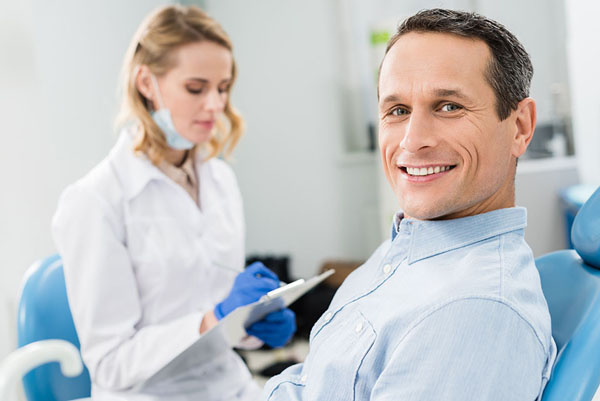Preparing For A Tooth Extraction
Your Guide To Tooth Extraction Preparation
A tooth extraction is a common dental procedure in which a tooth is removed from its socket in the jawbone. Tooth extractions may be necessary for various reasons, including severe tooth decay, infection, gum disease, overcrowding, or to make room for orthodontic treatment. Understanding the process and preparing properly can help ensure a smooth tooth extraction procedure and a speedy recovery.
If your dentist has recommended tooth extraction to protect your oral health, it’s beneficial to understand the process and be prepared. Explore Dr. Al Villalobos‘s guide to learn more about how you can prepare for your extraction.

Types of Tooth Extraction Procedures
There are two main types of tooth extraction:
- Simple Extraction: This type of extraction is performed for natural teeth that are visible above the gum line and can be easily removed with forceps. Your dentist or oral surgeon will likely use a local anesthetic to numb the area around the tooth for a painless extraction process.
- Surgical Extraction: This type of extraction is necessary for teeth that have not yet erupted or have broken off at the gum line. In this case, an incision is made in the gums to access the tooth, and your dentist or oral surgeon may need to separate it into pieces for removal. General anesthesia or dental sedation can help keep you comfortable during the surgical extraction process.
Knowing which type of extraction you need can help you feel more prepared for the day of your procedure. Ask your dentist or oral surgeon which type they’ll perform after they recommend a tooth extraction.
Preparation For Tooth Extractions
Preparing for tooth extraction involves several steps to ensure a successful procedure and a smooth recovery. Here are some important steps to take:
- Consultation With Your Dentist or Oral Surgeon: Your dentist or oral surgeon will examine your teeth and gums, take X-rays, and review your medical history to determine the best course of action for your tooth extraction treatment. Be sure to disclose all medications and supplements you’re taking, as some may need to be adjusted or stopped temporarily.
- Arrange for Transportation: If you’re receiving dental sedation or general anesthesia for your tooth extraction procedure, you’ll need a responsible family member or friend to drive you home and monitor you for a few hours after the appointment.
- Plan for Time Off: Depending on the complexity of the extraction, you may need to take a day or two off work or school to rest and recuperate. Strenuous activities should be avoided for at least 24 hours after the procedure.
- Follow Pre-Operative Instructions: Your dentist or oral surgeon will provide specific instructions on how to prepare for your tooth extraction, such as fasting, stopping certain medications, and avoiding smoking. Be sure to follow these instructions carefully.
- Wear Comfortable Clothing: Choose loose-fitting clothing that allows easy movement while you undergo the extraction process. It’s also a good idea to avoid wearing contact lenses on the day of the procedure.
Aftercare for Tooth Extractions
Proper aftercare is essential for a smooth healing process and to avoid complications like dry sockets. Here are some important steps to follow:
- Follow Dentist’s Instructions: Carefully follow all post-operative instructions provided by your dentist or oral surgeon. This may include guidelines on managing pain, avoiding certain activities, and keeping the extraction site clean.
- Rinse with Salt Water: Keep the extraction site clean by gently rinsing your mouth with warm salt water after meals. Avoid vigorous rinsing for the first 24 hours.
- Oral Hygiene Practices: Brush your teeth as normal, but avoid vigorous brushing near the extraction site for a few days to prevent disturbing the healing process. Also, refrain from using mouthwash that contains alcohol, as it can irritate and delay healing of the extraction site.
- Monitor for Severe Pain: Contact your dentist if you’re experiencing severe pain that persists despite taking prescribed pain medication, as this could be a sign of a complication like a dry socket.
- Avoid Certain Activities: For the first 24 hours after your tooth extraction, avoid smoking, spitting, using a straw, and drinking hot beverages. These activities can dislodge the blood clot that forms at the extraction site, leading to dry sockets and prolonged healing.
- Eat Soft, Nutritious Foods: Stick to soft, nutritious foods like yogurt, soup, and smoothies for the first few days after your tooth extraction. Avoid hard, crunchy, or hot foods that can irritate the extraction site. Rinse your mouth gently with warm salt water after meals to keep the area clean.
- Apply Cold Compresses: Applying an ice pack or cold compress to the cheek near the extraction site can help reduce swelling and discomfort in the first 24 hours after the procedure.
- Take Medications as Prescribed: Follow your dentist’s instructions for taking any prescribed pain medications, antibiotics, or other medications to promote healing and manage pain and swelling.
- Attend Follow-Up Appointments: It’s important to attend all follow-up appointments with your dentist or oral surgeon to ensure the extraction site is healing properly and to address any potential complications.

Frequently Asked Questions
Whether or not you can eat post-extraction depends on the specific instructions provided by your dentist or oral surgeon. In some cases, your dentist may instruct you to fast for a certain period before the procedure.
Your dentist or oral surgeon may instruct you to avoid certain medications that can increase the risk of bleeding, such as aspirin or blood thinners. Make sure to disclose all medications and supplements you’re taking to your dentist or oral surgeon.
Before a tooth extraction, it’s important to avoid smoking, drinking alcohol, or taking certain medications like aspirin or blood thinners, as these can increase the risk of bleeding and complications. Your dentist will provide specific instructions on what to avoid.
Your dentist or oral surgeon will provide specific instructions, but, in general, dental professionals recommend waiting at least an hour after the procedure before eating or drinking anything. Avoid using a straw for at least 24 hours to prevent dislodging the blood clot that forms at the dental extraction site.
Be Prepared for Your Tooth Extraction
By following your dentist’s instructions and properly preparing for your tooth extraction, you can minimize discomfort, avoid complications, and promote a smooth healing process. Don’t hesitate to ask your dentist or oral surgeon any questions you may have about the procedure, aftercare, or potential risks. With proper care and attention, you can ensure the best possible experience and a successful outcome for your tooth extraction treatment.
To schedule an appointment with our Jupiter dentist, contact us today by calling (561) 744-0677. Conveniently located near West Palm Beach’s Northside areas, including Hobe Sound, Tequesta, and more, our practice offers accessible general dentistry services.
